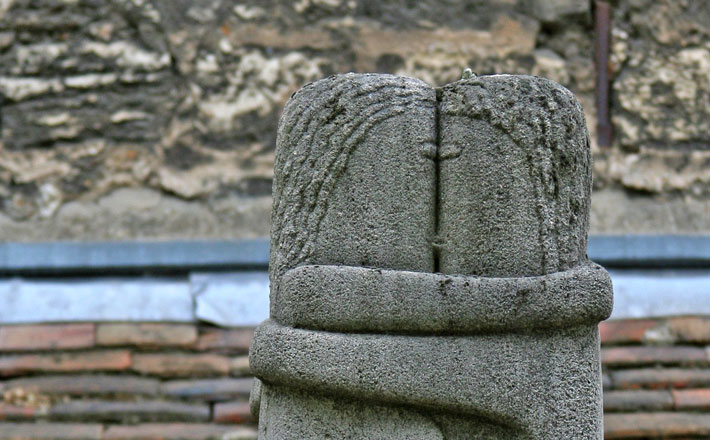Commentary on Psalm 85:1-2, 8-13
Sometimes we get confused early in the season of Advent, thinking we have a holy obligation to keep all joy and glory on hold until late in December.
We get some John the Baptist-style scolding that we better celebrate (or not celebrate!) Advent properly, this dour season of repentance the surrounding culture doesn’t understand.
Was John the Baptist really a scolder? What was his tone anyhow? I imagine a bellowing, raspy street-style preacher. But perhaps his tone was gentle, loving; perhaps his eyes were lovely and his voice melodic. People, after all, were drawn to him. And as he is portrayed as the fulfillment of Isaiah 40, we are comforted to recall that the deep theme of Isaiah 40 iscomfort.
On this John the Baptist Sunday, the Psalm could not be more comforting, hopeful, alluring — or downright beautiful. Beauty is what we would expect if the Lord is dawning upon Creation. After bearing up under a kind of extended exile (as N.T. Wright has argued) for centuries past the exile proper, Israel comes to its moment of new life. Psalm 85, a national lament, provides the words — and more importantly, the images! — for a people weary of exile and looking “to behold the beauty of the Lord” (Psalm 27:4). Their mood of repentance (shub) finally syncs with God’s returning/restoration (shebit) of the people. Finally there is forgiveness, which for them wasn’t just getting off the hook but also being healed, restored.
When the Lord comes, when this kingdom dawns, what will it look like? Only a poet could pique the imagination to envision its loveliness. Nothing flatfooted, no mere prose will do. Verses 10 and 11 probably should just be read, or sung, for to comment on them is to risk a mashing down of the wonder. “Steadfast love and faithfulness will meet; righteousness and peace will kiss each other. Faithfulness will spring up from the ground, and righteousness will look down from the sky.”
Israel’s greatest treasures were not things or buildings but words. Steadfast love, hesed, God’s and their own covenant loyalty, and faithfulness, ‘emet, a strong bond of commitment to God and each other. These two realities that are only real to those who understand and live into them, will “meet.” So we conceive of two beloved, catching each other’s eyes, walking briskly but not rushing, up close, full of joy.
And then it happens. Righteousness, zedek, the disposition and lifestyle of the holy people of God whose holiness really is nothing more than the gift of God’s mercy, and peace, shalom, the richness of a life with God that is calm, reconciling, and unfailingly hopeful: these two stalwarts among Israel’s most marvelous words do not just meet but “kiss.” A kiss: gentle, tender, not consummating things physically or clinging for dear life to the long-lost beloved, but just a kiss, a touch of the parts of us that speak words like hesed, ‘emet, zedek and shalom.
Who kisses, after all? The romantic people, yes — but parents kiss their children, and in wiser cultures, grownups kiss on greeting one another. The Bible after all urges us to “greet one another with a holy kiss.” Words fail us in explaining this kiss. But we can’t explain, but our lips are occupied in the kiss itself.
And so we can just settle in and be quiet before this Psalm, and before Israel’s hope and consolation. Psalm 85 contains that mysterious word “Selah.” “Selah” occurs 71 times in the Psalms. What does it mean? Scholars have labored over this for centuries. Clearly it is some sort of direction for what to do in worship, when the Psalms were sung or recited in the temple. But when “Selah” was declared, what was to be done? Some say it is derived from a root that means “to lift up” — and so perhaps it means to lift up your eyes, or to raise your voices and get louder. Others disagree, and claim it is from a different root that means “bend” — and so maybe “Selah” means to bow, or to kneel as an expression of humility. Yet other scholars argue that “Selah” marks a time to pause, for a little musical interlude from the orchestra, or simply for a time of silent meditation.
I find myself fond of the fact that we don’t really know. We never master the Bible, and I suspect God chuckles a bit when we’re befuddled. When we join that angelic host for worship in heaven, the leader will cry out, “Selah” — and we’ll see what the angels and saints do, and then we’ll get it, and do the “Selah” thing ourselves.
What we do know right now about “Selah,” this word we do not understand, is that it had something to do with people worshipping together. “Selah” was a cue, a direction, and we can safely assume the people gathered for worship did as they were told. At the proper time, they raised their heads, or bowed, or waited.
Worship is something we do together. We need some direction, to keep us organized, but also so we’ll worship in a way that is pleasing, not to me, but to God. There is an order to worship — which doesn’t mean it is merely rote, or boring, or lifeless. Quite enthusiastically we can follow the leader, who isn’t a performer but the one who gives us the cues for what we all do together for God. We need to be led; we need each other. The Psalms, even when a tad mystifying, teach us how to pray and worship God — together, and in good order.
And since it’s Advent, let’s vote for the meaning, “Pause.” John the Baptist would gently ask us to do just this, to take some time during this frantic season simply to “be still and know that God is God,” to “be still and know,” “to be still,” or simply “to be.”


December 7, 2014